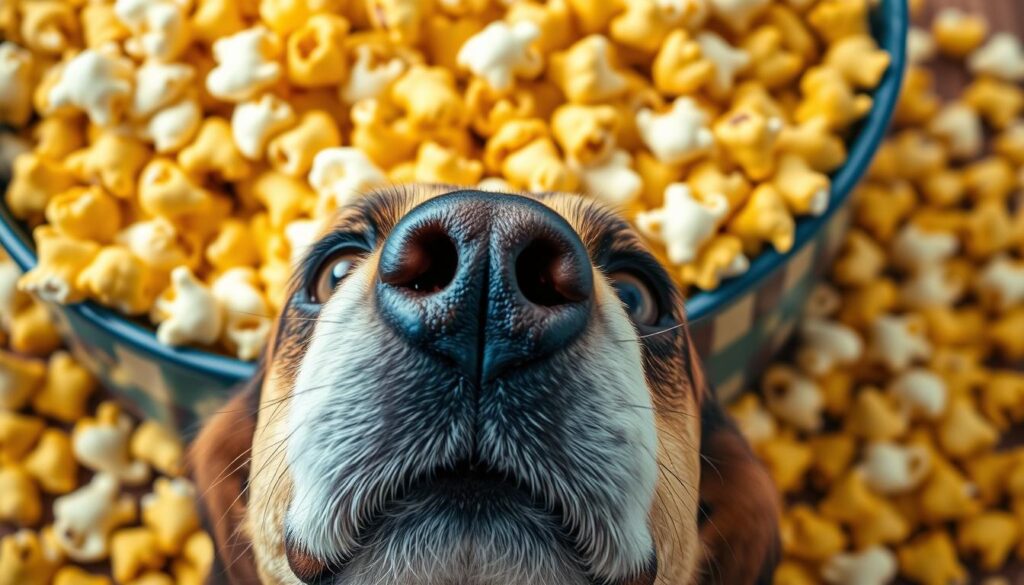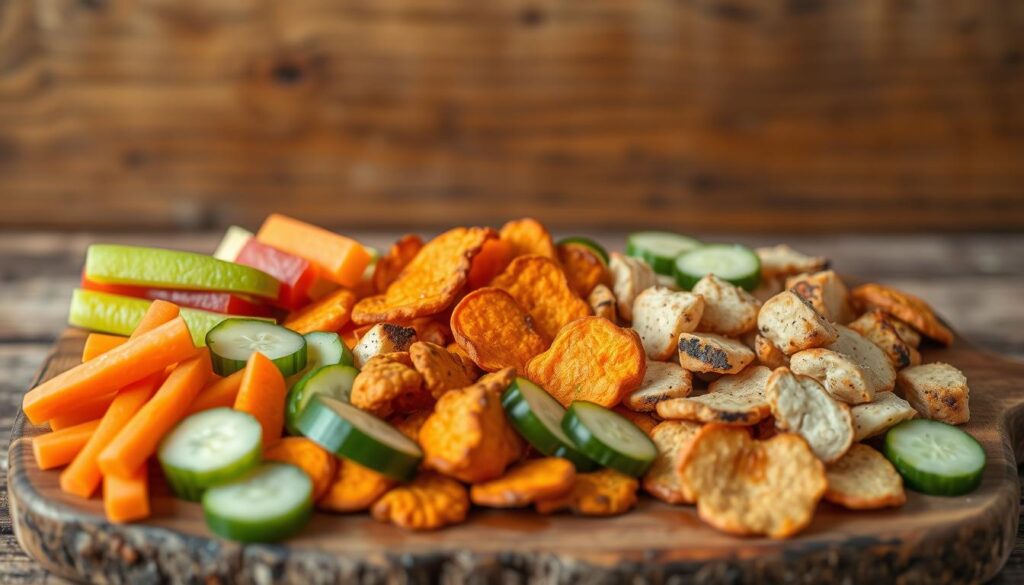Table of Contents
Is popcorn bad for dogs? As a dog parent, I remember the first time my furry companion looked up at me with those irresistible puppy eyes while I was enjoying a bowl of popcorn. That question raced through my mind—could this tasty snack actually harm my beloved pet?
Every pet owner wants to share special moments with their four-legged friend. But understanding the risks and benefits of popcorn and dogs is crucial for responsible pet care.
Popcorn can be a tricky treat for dogs. While plain, air-popped popcorn might seem harmless, not all popcorn is created equal. Your dog’s health and safety depend on knowing exactly what type of popcorn is appropriate and in what quantities.
Key Takeaways
- Plain, air-popped popcorn can be safe in small quantities
- Buttered or seasoned popcorn poses significant health risks
- Always monitor portion sizes for your dog
- Potential choking hazards exist with popcorn kernels
- Consult your veterinarian before introducing new treats
Understanding the Basics of Dogs and Popcorn
Popcorn can be an interesting snack for dog owners. They might wonder about its nutritional value and safety. It’s important to know what’s in popcorn and its benefits for pets.
What Makes Up Popcorn
Popcorn is a whole grain made from corn kernels. These kernels expand and puff when heated. The main ingredients are:
- Whole corn kernels
- Water content
- Natural corn starches
- Trace minerals
Nutritional Content of Plain Popcorn
Plain, air-popped popcorn is good for dogs in small amounts. It has several important nutrients:
| Nutrient | Benefit for Dogs |
|---|---|
| Magnesium | Supports muscle and nerve function |
| Phosphorus | Promotes bone health |
| Zinc | Boosts immune system |
| Fiber | Aids digestive health |
How Dogs Process Popcorn
Dogs digest whole grains differently than humans. They can handle plain, unseasoned popcorn in small amounts. Moderation is key to avoid digestive issues or choking hazards.
Always remove unpopped kernels to prevent dental or intestinal problems. When giving popcorn to your dog, use only plain, air-popped varieties without salt, butter, or seasonings.
Is Popcorn Bad for Dogs: Safety and Risks
When thinking about popcorn dangers for dogs, it’s important to know the risks. Popcorn isn’t toxic, but it can still harm your pet.
To keep your dog safe from popcorn, pay attention to a few things:
- Unpopped kernels can cause choking
- Sharp kernel pieces can hurt your dog’s teeth and gums
- Too much salt and butter can upset their stomach
Popcorn can be risky for dogs in two main ways. First, uncooked or half-cooked kernels can block their airway. This is a serious choking hazard. Second, these hard pieces can damage your dog’s teeth and might need a vet’s help.
| Popcorn Danger | Potential Risk Level | Recommended Action |
|---|---|---|
| Unpopped Kernels | High | Remove before serving |
| Excess Salt | Medium | Avoid salted varieties |
| Butter/Oils | High | Use plain air-popped only |
Digestive issues can arise from inappropriate popcorn consumption. Dogs with sensitive stomachs might get sick, have diarrhea, or other stomach problems from eating seasoned or buttered popcorn.
Always consult your veterinarian before introducing any new human food to your dog’s diet.
The Benefits of Plain Air-Popped Popcorn for Dogs
Discovering healthy popcorn for dogs can be exciting. Plain, air-popped popcorn is a nutritious treat for your furry friend. It offers surprising benefits when given in moderation.
Popcorn isn’t just for humans. It can be a low-calorie treat for dogs. It provides nutritional advantages when prepared carefully.
Essential Minerals and Vitamins
Air-popped popcorn has important minerals for your dog’s health:
- Magnesium: Supports muscle and nerve function
- Manganese: Helps bone formation and wound healing
- Phosphorous: Promotes strong teeth and bones
- Zinc: Boosts immune system health
Fiber Content Benefits
The fiber in plain popcorn aids your dog’s digestive system. A small amount can help:
- Regulate bowel movements
- Support healthy gut bacteria
- Promote feelings of fullness
Low-Calorie Treat Option
For pet owners watching their dog’s weight, air-popped popcorn is a guilt-free snack. Here’s a quick nutritional breakdown:
| Serving Size | Calories | Protein | Fiber |
|---|---|---|---|
| 1 cup air-popped popcorn | 30 calories | 1g | 1.2g |
Remember, healthy popcorn for dogs should always be plain, unsalted, and free from butter or additional seasonings. Moderation is key to enjoying these benefits safely.
Dangerous Popcorn Toppings and Additives for Dogs
Sharing popcorn with your dog can be tricky. Not all toppings are safe for them. It’s important to know which ones to avoid.
Some popcorn toppings can be very harmful to dogs. Here are some of the worst ones:
- Butter and Oil: High-fat content can lead to pancreatitis and rapid weight gain
- Salt: Excessive sodium can cause dehydration and electrolyte imbalances
- Artificial seasonings: Chemical additives may trigger digestive issues
- Chocolate or caramel coatings: Potentially toxic ingredients that can harm your dog
Dogs can’t handle many human foods because their digestive systems are different. Buttered popcorn can make them obese. Artificial flavors and too much salt can upset their stomachs.
Your dog’s health depends on careful food selection and understanding potential risks.
For your dog’s safety, give them plain, air-popped popcorn. If you’re unsure, talk to your vet about safe treats for your dog.
Health Risks of Feeding Dogs Buttered Popcorn
Buttered popcorn might seem like a harmless treat for your furry friend. But it can cause serious health problems. These issues are something pet owners should think about carefully.
Dogs have sensitive digestive systems. They react differently to human foods. Buttered popcorn can lead to more than just stomach upset in dogs.
Pancreatitis: A Critical Concern
Buttered popcorn is high in fat, which raises the risk of pancreatitis in dogs. This condition makes the pancreas swell and get irritated.
- Symptoms include severe abdominal pain
- Potential for persistent vomiting
- Risk increases with repeated fatty food consumption
Obesity and Weight Management Challenges
Butter and salt in buttered popcorn add a lot of calories. These extra calories can make dogs gain weight quickly.
| Popcorn Type | Calories per Cup | Fat Content |
|---|---|---|
| Plain Air-Popped | 30 | Low |
| Buttered Popcorn | 110 | High |
Digestive System Complications
The butter, salt, and seasonings in buttered popcorn can harm your dog’s digestive system. Chronic digestive issues may develop from repeated exposure to these ingredients.
- Potential for diarrhea
- Risk of stomach upset
- Possible nutrient malabsorption
Always talk to your vet about safe treats. This can help avoid these health risks.
Common Popcorn-Related Hazards for Dogs

Popcorn might seem like a harmless snack, but it poses serious risks for dogs. Knowing these dangers can help keep your pet safe from health issues.
Unpopped kernels are especially dangerous for dogs. They can lead to:
- Dental damage from hard kernel fragments
- Potential choking hazards, especially for smaller breeds
- Risk of internal digestive blockages
The sharp edges of popcorn hulls can also cause problems. These small, sharp pieces may get stuck in your dog’s throat or digestive tract, leading to emergencies. Small dogs are especially at risk.
Dogs with sensitive digestive systems face even more risks. Undigested kernels can cause:
- Intestinal discomfort
- Potential gastrointestinal obstruction
- Painful bowel movements
To avoid these risks, always watch your dog when giving them popcorn. Make sure to remove any unpopped kernels. Look for safer, more nutritious treats for your dog.
Safe Serving Sizes Based on Dog Weight
Finding the right amount of dog popcorn is key for your pet’s health. Treats should not make up more than 10% of your dog’s daily calories. The right amount depends on your dog’s weight and nutritional needs.
Remember, moderation is crucial when giving popcorn as treats. Air-popped popcorn has about 30 calories per cup. It’s a low-calorie choice for dogs.
Guidelines for Small Dogs
For small dogs under 20 pounds, portion control is vital. A safe serving size is about:
- 2-3 pieces of plain, air-popped popcorn
- Maximum of 1-2 tablespoons per week
- Always remove unpopped kernels
Recommendations for Medium Dogs
Medium-sized dogs can have a bit more while staying balanced:
- 5-6 pieces of plain popcorn
- No more than 1/4 cup per week
- Ensure popcorn is completely plain
Portions for Large Dogs
Larger dogs can have more popcorn, but still be careful:
- 10-12 pieces of plain popcorn
- Up to 1/2 cup per week
- Monitor for any digestive changes
Pro tip: Always check with your vet before adding new treats to your dog’s diet. Each dog is different and may need special care.
Signs Your Dog Has Eaten Too Much Popcorn
Knowing the signs of popcorn overconsumption in dogs is key. It helps you act fast if your dog eats too much. Dogs may show several signs that need your quick attention.
Look out for these important signs of too much popcorn:
- Digestive Distress: Vomiting or diarrhea within 12-24 hours of eating popcorn
- Unusual lethargy or decreased energy levels
- Visible abdominal discomfort or bloating
- Loss of appetite
- Excessive gas or unusual bowel movements
The symptoms can differ based on your dog’s size, health, and how much popcorn they ate. Smaller dogs might react more strongly than bigger ones.
“Always monitor your pet closely after introducing new foods to their diet” – Veterinary Nutrition Experts
If your dog shows persistent symptoms or seems uncomfortable, call your vet right away. Some dogs have very sensitive stomachs. Even a little popcorn can upset them.
Too much popcorn can cause serious problems like pancreatitis or intestinal blockage. So, it’s very important to watch what your dog eats closely.
Alternative Healthy Snacks for Dogs

Are you looking for tasty, healthy snacks for your dog? There are many safe and delicious options beyond popcorn. These treats will make your dog happy and keep them healthy.
Fruits and vegetables are great for dogs. They offer many health benefits and taste good too. Here are some healthy choices:
- Carrots: Low-calorie crunchy treats packed with beta-carotene and fiber
- Apples: Rich in vitamins and great for dental health (remove seeds)
- Pumpkin: Supports digestive health and provides essential nutrients
- Celery: Hydrating and low-calorie option with minimal calories
When trying new snacks, start with small amounts. Watch for any signs of allergies. Cut the snacks into small pieces to avoid choking. Talk to your vet to find the right amount for your dog.
Remember, it’s important to not overdo it. These snacks are healthy, but they shouldn’t replace your dog’s regular meals. Mix up the snacks to keep things interesting and ensure your dog gets a variety of nutrients.
How to Safely Share Popcorn With Your Dog
Sharing snacks with your furry friend can be fun. But, when it comes to popcorn, you need to be careful. Knowing how to safely give popcorn to dogs is important.
When it comes to popcorn for dogs, preparation is key. The safest choice is plain, air-popped popcorn without any seasonings.
Preparation Methods
- Use an air popper to avoid oil and butter
- Ensure kernels are fully popped to prevent choking
- Remove any unpopped or partially popped kernels
- Allow popcorn to cool completely before serving
Feeding Guidelines
When giving popcorn to your dog, remember to keep it small. Start with a little and watch how your dog reacts.
| Dog Size | Recommended Popcorn Portion |
|---|---|
| Small Dogs | 2-3 pieces |
| Medium Dogs | 4-5 pieces |
| Large Dogs | 6-7 pieces |
Safety Precautions
- Watch for signs of digestive discomfort
- Avoid salted or flavored popcorn
- Never feed popcorn with additives like butter or caramel
- Stop feeding if your dog shows any negative reactions
Remember, safe popcorn for dogs is simple and requires watching closely. Always talk to your vet before adding new treats to your dog’s diet.
When to Contact Your Veterinarian
Knowing when to call a vet after a dog popcorn emergency is key. Some situations need quick vet help to avoid bigger problems.
If your dog has unexpected symptoms after eating popcorn, it’s a red flag. Spotting these signs early is vital for your pet’s health.
- Call your veterinarian right away if your dog shows signs of:
- Persistent choking
- Difficulty breathing
- Severe vomiting
- Significant digestive distress
Here are some times to call the vet for popcorn issues:
| Symptom | Urgency Level | Recommended Action |
|---|---|---|
| Mild choking | Moderate | Monitor closely, contact vet if persists |
| Allergic reaction | High | Seek immediate veterinary care |
| Uncontrolled vomiting | High | Call veterinarian immediately |
Remember, your dog’s safety is paramount. When in doubt, always consult a professional veterinarian who can provide expert guidance specific to your pet’s condition.
Some popcorn emergencies might not show symptoms right away. Keep an eye on your dog’s behavior or eating habits after they eat popcorn.
Conclusion
Your dog’s health is important when giving them human food, like popcorn. Air-popped kernels can be a rare treat, but not a regular snack. Vets say to stick with dog treats made just for them.
When giving popcorn to dogs, be careful with how much and how it’s prepared. Plain, unbuttered popcorn is safest. Avoid popcorn with salt, butter, or artificial flavors. These can harm your dog’s health.
Your dog’s health should always come first. Even plain popcorn should be given with caution. Talking to your vet about safe snacks is a good idea.
Knowing the right way to share human food with your dog is key. Choose balanced snacks, watch the amounts, and be careful with new foods. This keeps your dog happy and healthy.
There are no reviews yet. Be the first one to write one.

